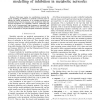540 search results - page 4 / 108 » A Computational Logic Approach to Syllogisms in Human Reason... |
TARK
2009
Springer
14 years 18 days ago
2009
Springer
The logical omniscience feature assumes that an epistemic agent knows all logical consequences of her assumptions. This paper offers a general theoretical framework that views log...
ICCS
2001
Springer
13 years 10 months ago
2001
Springer
Nowadays, people start to accept fuzzy rule–based systems as flexible and convenient tools to solve a myriad of ill–defined but otherwise (for humans) straightforward tasks s...
POPL
2012
ACM
12 years 1 months ago
2012
ACM
Differential privacy is a notion of confidentiality that protects the privacy of individuals while allowing useful computations on their private data. Deriving differential priva...
AINA
2009
IEEE
14 years 26 days ago
2009
IEEE
—This paper makes two contributions towards the logical modelling of inhibition in metabolic networks. First it exposes the logical inconsistency of an existing state-of-the-art ...
AISC
1998
Springer
13 years 10 months ago
1998
Springer
The use of computer algebra is usually considered beneficial for mechanised reasoning in mathematical domains. We present a case study, in the application domain of coding theory, ...

